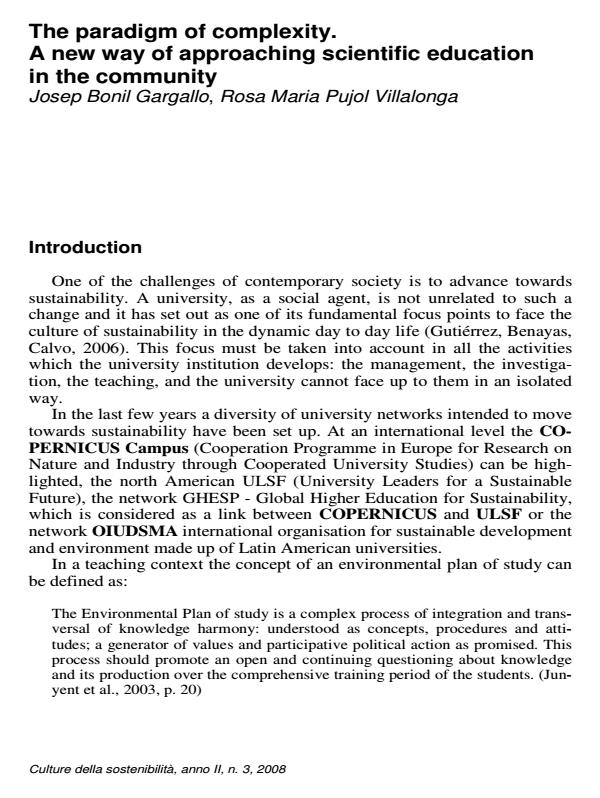The paradigm of complexity. A new way of approaching scientific education in the community
Titolo Rivista CULTURE DELLA SOSTENIBILITA '
Autori/Curatori Rosa Maria Pujol Villalonga, Josep Bonil Gargallo
Anno di pubblicazione 2008 Fascicolo 2008/3
Lingua Inglese Numero pagine 18 P. 11-28 Dimensione file 152 KB
DOI
Il DOI è il codice a barre della proprietà intellettuale: per saperne di più
clicca qui
Qui sotto puoi vedere in anteprima la prima pagina di questo articolo.
Se questo articolo ti interessa, lo puoi acquistare (e scaricare in formato pdf) seguendo le facili indicazioni per acquistare il download credit. Acquista Download Credits per scaricare questo Articolo in formato PDF

FrancoAngeli è membro della Publishers International Linking Association, Inc (PILA)associazione indipendente e non profit per facilitare (attraverso i servizi tecnologici implementati da CrossRef.org) l’accesso degli studiosi ai contenuti digitali nelle pubblicazioni professionali e scientifiche
The paradigm of complexity. A new way of approaching scientific education in the community ABSTRACT: One of the objectives of scientific education has been to offer training of the community to meet the challenges its environment presents. To provide an answer to these objectives different proposals have been developed which have shown potential and limitations to make the appropriate scientific training for the social changes. In this paper the paradigm of complexity is proposed as a new design, application and evaluation framework of school scientific activity. The paradigm of complexity consists of a continual journey between all the interests. It is a continual movement in the dialogue between antagonisms and between levels to suggest the vision of the facts of the world as transformation processes where the conceptual model, the ethical perspective and action on the world are all relevant. From the paradigm of complexity a new perspective is brought about which helps us reflect on the processes which have been made in the teaching and learning of experimental sciences. In some of the aspects of scientific school activity which are reinterpreted when in contact with the principles of the paradigm of complexity, there is the need to rethink the conceptual models, develop complex thought, and reconsider the relationship between the disciplines and the relevance of action and emotions within the processes of the teaching and learning of experimental sciences.
Rosa Maria Pujol Villalonga, Josep Bonil Gargallo, The paradigm of complexity. A new way of approaching scientific education in the community in "CULTURE DELLA SOSTENIBILITA '" 3/2008, pp 11-28, DOI: